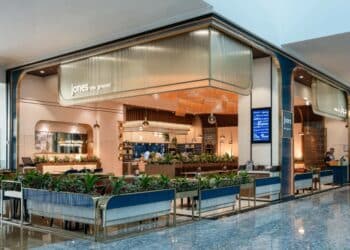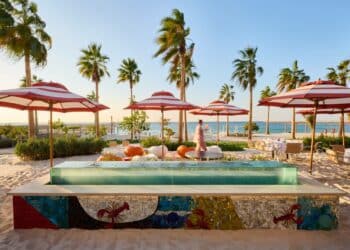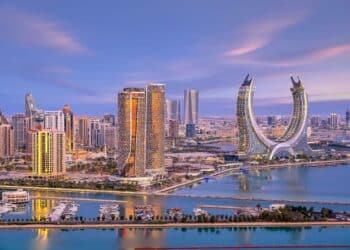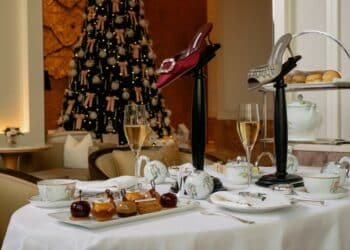Adam D’Sylva, co-owner and head chef at Coda bar and restaurant in Melbourne, sits down to talk with Sophia Soltani after coming to town to attend an evening with chef Ryan Clift, hosted by Steelite International at the Emirates Academy of Hospitality Management.
“I am no Moët & Chandon and I wholly represent my own style of food, I have a busy restaurant every night with great produce, I don’t want to be an occasion restaurant and that is how I reflect my art in my cooking.”

With rich tones of Italian and Indian running through his veins, culinary genius Adam D’Sylva attributes his success and love of good food to his mother, grandmother and aunt who encouraged him from an early age to participate and observe in their cooking tactics. Beginning his career with an apprenticeship at Hilton on the Park in Melbourne, D’Sylva now co-owns restaurants CODA and TONKA which have both become extensions of his vibrant heritage.
Can you talk through your career background?
I began my career with an apprenticeship at Hilton on the Park in Melbourne and it was such a diverse environment and really very multicultural, so I had the chance to work with some amazing chefs, bearing in mind at that stage I wasn’t too well travelled so it impacted me a lot. I then moved on to work as a chef at the popular celebrity stomping ground Cosi, in South Yarra.
After returning from my overseas culinary travels, I then landed a position under the tutelage of the highly respected chef, Geoff Lindsay, at the Pearl restaurant. I then went on to become the very first head chef of Longrain, Melbourne. It seemed only sensible that I would open my own restaurant so to fast-forward to 2009 I launched CODA, and more recently TONKA in 2013.
Coming from such a diverse background, what was sitting on your kitchen table whilst you were growing up?
You could say I was born into meat and rice! Indian and Italian are both really very strong, dominant cuisine cultures, so growing up at family gatherings there was always a bowl of pasta, and a bowl of basmati rice with some kind of curry, that was the norm. I made pizzas and worked in my father’s butchers shop, so I was never afraid to be around food.
TONKA has been going for a year and a half, how well would you say it has performed and what is the concept behind it?
I am a really diverse person, coming from Melbourne and a culturally mixed home, so one day I jokingly said that we should do an Indian inspired restaurant to tap into my Indian side. I didn’t want to be modern in terms of taste, texture and flavour, I wanted to be modern in presentation without compromising the traditional elements of real Indian cuisine. So we are now more of an Indian inspired restaurant.
With two restaurants on your current portfolio, what is next on your agenda?
Well, I jokingly said I should do an Italian restaurant recently and that is how TONKA came about! If I were to do another concept, I would do traditional, peasant style Italian that represents simple real food. I would potentially be interested to do something similar with Steelite, like Clift’s event.
Where do you draw your inspiration from to consistently come up with new, inventive dishes?
All parts of life, my mother, grandmother and aunty have all been such big inspirations in terms of my cooking, but be it travelling the globe and seeing new cultures, new styles of cooking to reading books and magazines, the beauty of being a chef is a little idea or experience can transcend into an amazing dish.
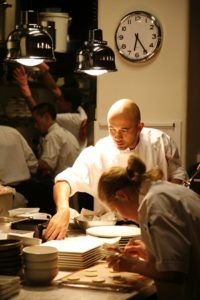
How would you say the F&B industry in Dubai compares to that of Melbourne?
I have worked all over the world, cooked in many countries from India to Asia and around the UK. I have experienced so many different cultures and different avenues, but in Melbourne there isn’t the room to have too many luxury outlets and too many choices, whereas in Dubai there is the flexibility to cater for, and cook for the luxury segment. This has the facility to be an endless array of different outlets. Compared to Melbourne, we can only have a few select ones to pick from.
How would you say you have made your mark on the F&B industry?
I wouldn’t focus too much on how I have made my mark, more as to how I have been perceived which is more important to me. I am no Moët & Chandon and I wholly represent my own style of food, I have a busy restaurant every night with great produce, I don’t want to be an occasion restaurant and that is how I reflect my art in my cooking. I have also found that in Melbourne people require accessible food perhaps that is how you would say I’ve made my mark.

